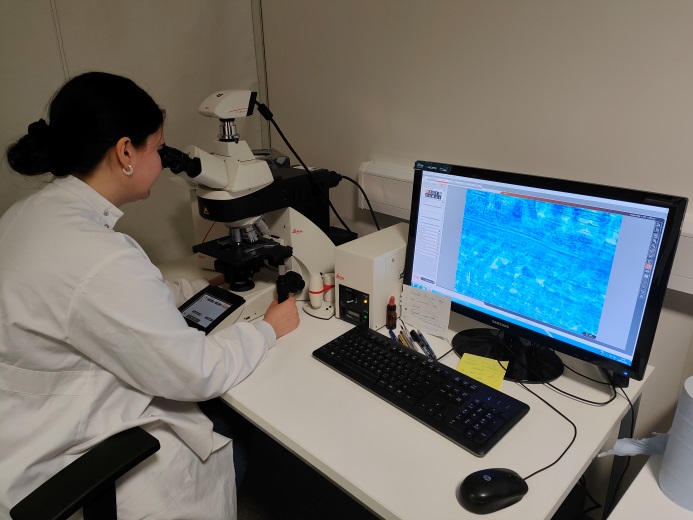
Mgr inż. Magdalena Cieplak
4t Year doctoral student,
Discipline: Agriculture and Horticulture
Ireland, University College Dublin (UCD), Earth Institute, and the School of Agriculture and Food Science
In research, I work with the pathogen Blumeria graminis f.sp aveane, which causes an oat disease called powdery mildew. A very interesting aspect of research on this disease is to understand the plant-pathogen interaction, in which knowledge of the mechanisms of the resistance response of oat plants plays an important role.
 Photo 1. Magdalena Cieplak, MSc working with a microscope at Earth Institute laboratory, UCD
Photo 1. Magdalena Cieplak, MSc working with a microscope at Earth Institute laboratory, UCD
Once again, I had the pleasure to visit University College Dublin (UCD) as part of an Erasmus + international internship on 09.01.-09.03.2023. The supervisor of the trainee was Dr. Aisling Reilly, who is a lecturer and assistant professor at this university.
 Photo 3 School of Agriculture and Food Science, UCD
Photo 3 School of Agriculture and Food Science, UCD
The visit enabled me to continue research related to the histological evaluation of Blumeria graminis f.sp aveane. The aim of the trip was to analyze isolates with different levels of virulence using a fluorescence microscope at the Earth Institute and the School of Agriculture and Food Sciences. During my stay, I tested a set of isolates collected at the Institute of Genetics, Breeding and Plant Biotechnology, University of Life Sciences in Lublin. Samples of isolates were tested on a set of genotypes with different genes carrying resistance to powdery mildew of oats.
 Photo 4 Laboratory at School of Agriculture and Food Science, UCD
Photo 4 Laboratory at School of Agriculture and Food Science, UCD
Thanks to this visit, I learned microscopic observations related to the resistance response of plants to pathogens and the mechanism of the pathogen penetration process into the host tissues. The stay resulted in very interesting results. During my visit, I not only gained experience and knowledge, but also met many wonderful people.
 Photo 5 The building of O’Brien Centre for Science where Earth Institute is located
Photo 5 The building of O’Brien Centre for Science where Earth Institute is located
University of Life Sciences in Lublin
13 Akademicka Street, 20-950 Lublin
VATIN 712 010 37 75
REGON no. 000001896
ePUAP: /UP-Lublin/SkrytkaESP


